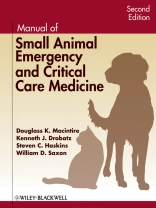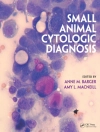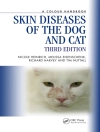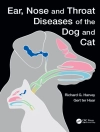Manual of Small Animal Emergency and Critical Care Medicine,
Second Edition presents essential information on common
emergencies in small animals using a concise, practical outline
format. Offering a thorough update to this classic reference,
the new edition provides new chapters on orthopedic injuries and
wound management, significant revisions to the treatment protocols,
and expanded toxicology information, as well as new references and
drug information. The book retains its logical division into two
parts, the first covering initial stabilization and the second
offering a systems approach to specific conditions.
As in the previous edition, chapters are extensively indexed and
cross-referenced to facilitate ease of use in emergency situations.
With many formulas, tables, drug dosages, and illustrations,
Manual of Small Animal Emergency and Critical Care Medicine
is an indispensable, convenient resource for busy emergency
clinicians, whether they are new graduates or seasoned
professionals.
Table des matières
Part I: Life Support Initial Stabilization, Monitoring and Intesive Care of the Critically Ill Patient.
1. Approach to the Patient.
2. Emergency Room Readiness.
3. Cardiopulmonary-Cerebral Resuscitation (CPCR).
4. Shock.
5. Anethetic Protocols for Short Procedures.
6. Fluid Therapy.
7. Monitoring Critical Patients.
8. Nutritional Support of Critical Patients.
Part II: Specific Protocols and Procedures for Emergency Conditions.
9. Respiratory Emergencies.
10. Cardiac Emergencies.
11. Gastrointestinal Emergencies.
12. Urologic Emergencies.
13. Neurologic Emergencies.
14. Hematologic Emergencies.
15. Endocrine and Metabolic Emergencies.
16. Reproductive Emergencies.
17. Pediatric Emergencies.
18. Ocular Emergencies.
19. Othopedic Emergencies.
20. Dermatologic Emergencies.
21. Miscellaneous Emergencies.
22. Wound Management.
Appendices
A propos de l’auteur
Douglass K. Macintire was previously Director of Intensive
Care, College of Veterinary Medicine, Department of Small Animal
Surgery and Medicine, Auburn University and a Diplomate of ACVIM
and ACVECC.
Kenneth J. Drobatz is Director, Trauma Emergency Service,
and Professor and Chief of Critical Care, Matthew J. Ryan
Veterinary Hospital, University of Pennsylvania, and a Diplomate of
ACVIM and ACVECC.
Steven C. Haskins is Director, Small Animal Intensive
Care Unit, Veterinary Medical Teaching Hospital, University of
California, Davis and is a Diplomate of ACVA and ACVECC.
William D. Saxon is Telemedicine Consultant, IDEXX and a
Diplomate of ACVIM and ACVECC.












